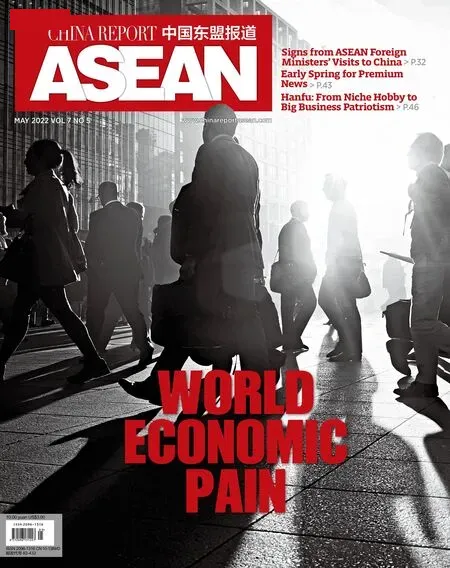Where Is the World Economy Headed?
By Zhang Tao,Qiu Hui,Wang Zhe
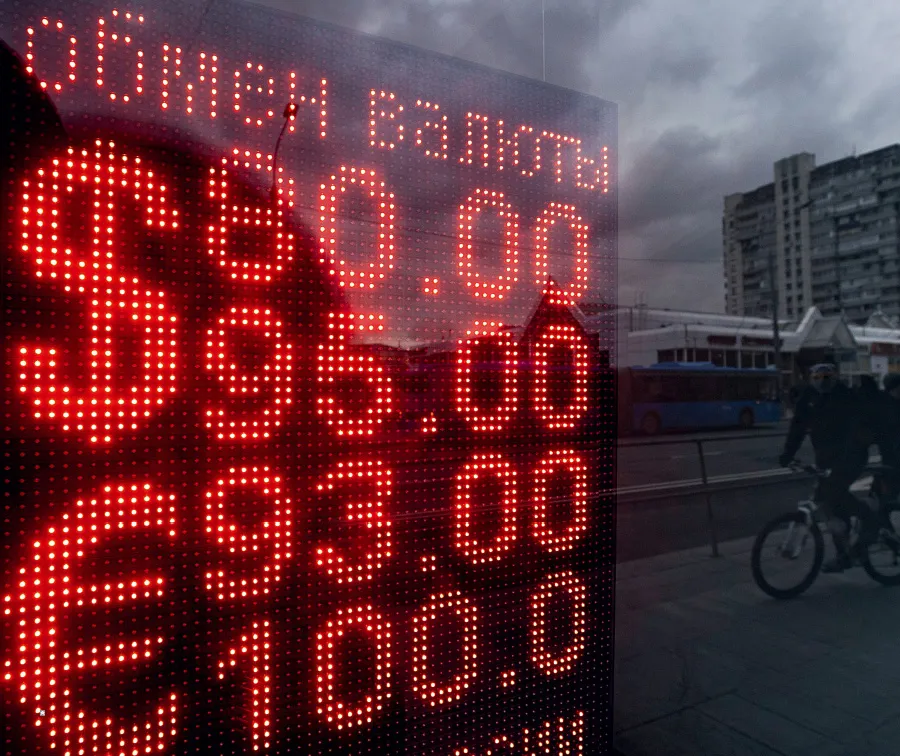
A digital sign displays exchange rates in the window of a currency exchange bureau in Moscow,Russia,on February 24,2022.(ANDREY RUDAKOV)
The Russia-Ukraine crisis is increasing inflation around the world,exacerbating the rift in globalization,and leaving policymakers with little space to maneuver
I nflation in the United States and Europe has hit fourdecade highs.Russia’s special military operation in Ukraine is continuing,whereas Finland and Sweden are discussing the possibility of joining the North Atlantic Treaty Organization (NATO).The latest COVID-19 outbreak in China’s Shanghai and corresponding strict control measures are extending delays of goods shipped from European ports like Hamburg and Rotterdam.
Fourteen years have passed since the 2008 global financial turmoil.The world economy has weathered the Eurozone debt crisis,China-U.S.trade war and COVID-19 outbreaks over the last three years,but still faces mounting downward pressure.Inflation has spread around the world in the past year.As central banks of various countries discussed whether it was transient or persistent,Russia launched a military operation against Ukraine,further raising the prices of crude oil and commodities.The continuing COVID-19 pandemic is hurting both supply and demand and disrupting the already strained logistic system,which further exacerbated fuel prices.
Economists polled by The Wall Street Journal this month estimated the probability of the economy going into recession sometime in the next 12 months at 28 percent,up from 13 percent in January.
Russia-Ukraine Conflict
The ongoing Russia-Ukraine conflict started on February 24 and has caused a domino effect on the global economy and geopolitical security.It is the most pressing issue for the global economy right now.
The United States and some European countries imposed sanctions on Russia after the conflict broke out,forbidding or reducing imports of oil,gas,and coal from the latter.Russia is the world’s largest exporter of natural gas and second largest exporter of oil.The country’s exports of natural gas using pipeline transmissions,liquefied natural gas,and crude oil account for 26 percent,8 percent,and 12 percent of the world’s total,respectively.The conflict has resulted in severe shake-ups in the international energy market and skyrocketing oil and gas prices.Bearing the brunt of the turbulence were countries heavily dependent on energy imports,particularly the Eurozone,which imports 30 percent of oil and 39 percent of natural gas from Russia.The figures for Germany were 35 percent and 55 percent,respectively.
The crude oil crisis is a structural problem that cannot be mitigated through increasing production of other energy in the short run,said Bai Ming,deputy director of international market research at the Chinese Academy of International Trade and Economic Cooperation,the Ministry of Commerce.Disruption to the global supply chain for oil will bring a sustained adverse impact on the international energy market and the global economy.
Russia is the world’s largest wheat exporter and Ukraine is the fifth largest.The two countries together export close to 30 percent of the world’s wheat supply and around 20 percent of the world’s total corn supply.Escalating conflict between the two countries has hampered transportation.Major importers of crops from Russia and Ukraine to the Middle East and North Africa are suffering most.Ukraine’s Ministry of Agrarian Policy and Food said in March that the country had sown around 7 million hectares of spring grains,down from the 15 million hectares over the same period last year.Media statistics showed that the price of wheat in the international market has tripled since the beginning of 2022.Moreover,Russia and Belarus are both major fertilizer exporters.Indirect influence of restrictions on fertilizer export on global grain supply should not be underestimated.
The price of grain in the international market is soaring.Obstacles hindering Russia and Ukraine from exporting are likely a prelude to global food supply shortage,said Liang Guoyong,a senior economist with the United Nations Conference on Trade and Development.Higher energy prices will increase the production cost for grain,and in turn affect grain harvest and storage this year.As a result,the threat of a food crisis might linger until the end of this year and early 2023.Many low-income countries would bear the brunt of the crisis.
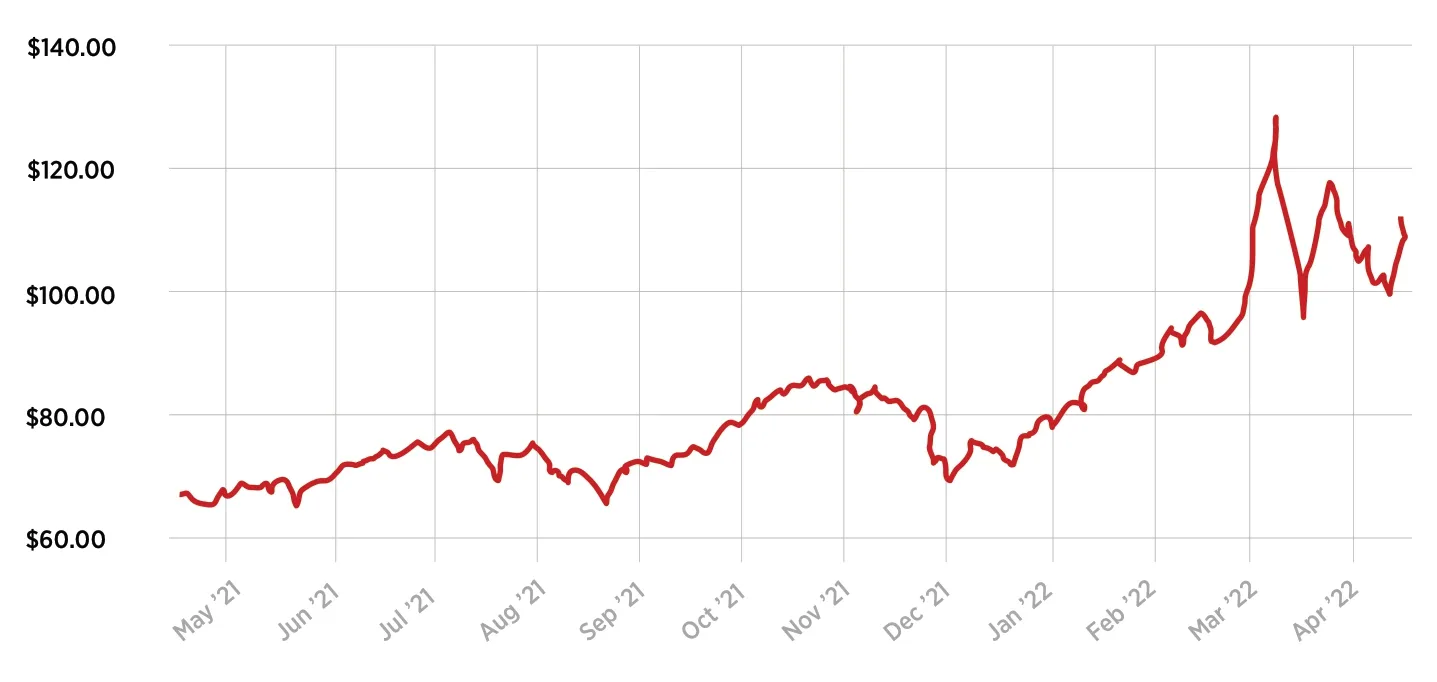
Brent Crude
Russia and Ukraine also produce and export industrial metals including____palladium,titanium,aluminum,and nickel as well as the inert gas neon which is essential to the production of semiconductors.Prices for these industrial metals and materials have soared since the outbreak of the conflict.A report from Moody’s said continuation of the Russia-Ukraine crisis would jeopardize the global semiconductor industry.Russia is an important supplier of several key metal elements crucial for the world’s aerospace industry.The crisis will damage aerospace in developed countries in Europe and America.
“The Russia-Ukraine conflict dealt another blow to the already strained global supply chain by further tightening both supply and demand and destabilizing market confidence,”said Liu Ying,a researcher with the Chongyang Institute for Financial Studies at Renmin University of China.
Although Russia’s economy accounts for merely 3 percent of the world’s total and Ukraine contributes an insignificant amount,the conflict is exerting far greater pressure on the world economy,noted Wang Huiyao,director of the Center for China and Globalization.In 1973,oil-producing Arab countries imposed an oil embargo on Western countries that supported Israel.In 1979,a revolution broke out in Iran.Both Arab countries and Iran held a smaller share of the global economy than Russia,but actions in those countries profoundly influenced____the global economy,Wang said,noting that the potential for a chain reaction caused by the Russia-Ukraine conflict should not be underestimated.
The Russia-Ukraine conflict is escalating geopolitical tension.After the outbreak of the conflict,Finland,which had long maintained a militarily non-aligned status,saw a shift of public opinion.More than 60 percent of Finish citizens were found to support joining NATO,whereas the figure was just 21 percent in 2017.The Finnish government said in April that it was considering submitting an application for NATO membership.The Swedish government announced that a similar decision would be made soon.The Russian government responded suggesting dire consequences for proceeding with plans to join the alliance.The powder keg ignited in Ukraine is spreading its destructive force to surrounding regions.
Alarming Inflation
Another short-term event closely linked to the Russia-Ukraine conflict is inflation.
The U.S.consumer price index,a closely-monitored gauge of broad inflation,jumped 8.5 percent year on year,according to data released by the country’s Labor Department on April 12.The country’s inflation has not been this high since 1981.Back then,a Gallup survey showed that close to half of respondents were optimistic about_the country’s economic prospects,and another 35 percent said the economy would maintain the status quo.Following that,the U.S.economy went into recession and the unemployment rate in 1982 was 10.8 percent.

People walk out from a McDonald’s restaurant in Moscow,Russia,on March 9,2022.(VISUAL.PEOPLE.CN)
High energy prices similarly pushed up inflation in the Eurozone to 7.5 percent in March,the highest in 40 years.The figure far exceeded the 2-percent target set by the European Central Bank (ECB).
In Asia,the Monetary Authority of Singapore (MAS) said on April 14 that the country’s core inflation rate would see drastic rise in the coming months.The authority revised upward Singapore’s headline inflation forecast for 2022 to 4.5-5.5 percent from 2.5-3.5 percent previously.To cope with rising inflation,the MAS announced it recentered the mid-point of the exchange rate policy band known as the nominal effective exchange rate (S$NEER) at the prevailing level.It also slightly increased the slope of the S$NEER policy band.
The ongoing Russia-Ukraine conflict started on February 24 and has caused a domino effect on the global economy and geopolitical security.
8.5 %
The U.S.consumer price index,a closely-monitored gauge of broad inflation,jumped8.5 percentyear on year,according to data released by the country’s Labor Department on April 12.
Kristalina Georgieva,managing director of the International Monetary Fund,said at a March 10 online press conference that the spillover effect of the Russia-Ukraine conflict is being transmitted through commodities prices,the real economy,financial conditions,and business confidence.According to her,the surging prices for energy and other commodities like corn and wheat will intensify inflation pressure for many countries,which is especially dangerous for families living in poverty.Potential impacts on the real economy include contraction in trade and a dent in consumer confidence and purchasing power.“On inflation,we might see tightening measures come faster and go further,”she said,noting that emerging markets may face dual pressure of tightening financial conditions and declining business confidence.
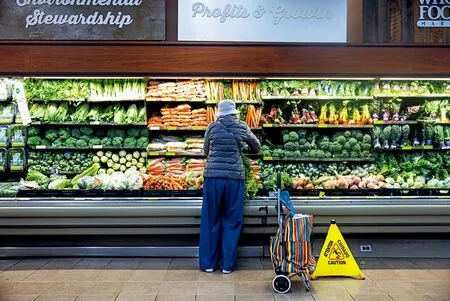
Produce for sale at a Whole Foods grocery store in Washington DC,USA,April 12,2022.(JIM LO SCALZO)
The current inflation pressure could cause more adverse spillover effects on global economic recovery,said Zhang Yuyan,head of the Institute of World Economics and Politics at the Chinese Academy of Social Sciences.Drastic fluctuation in exchange rates and capital flight are highly likely to happen in emerging economies and developing countries,he added.
Since the 2008 financial crisis,interest rates in major economies around the world have been relatively low,and the United States and Eurozone have been implementing a quantitative easing policy.Inflation pressure started to emerge as early as 2019.After the COVID-19 pandemic struck in 2020,central banks generally chose interest rate cuts to support the economy and employment.Indiscriminate stimulus with expansionary monetary policy made inflation an inevitable consequence.The Russia-Ukraine conflict only exacerbated the situation and sped up the process.Even more troubling,it complicated the problem and made it unsolvable through monetary policy alone.
Major economies had to increase interest rates,but found it hard to decide on the extent of the increase.Inflation will not abate if the increase is insufficient,whereas too drastic monetary policy would make the economy more vulnerable to a hard landing and result in economic stagnation and high inflation.
On March 17,the U.S.Federal Reserve,“the Fed,”raised the interest rates by 25 basis points.The interest rate is expected to be raised six times in the year.On the other side of the Atlantic Ocean,the ECB chose a more moderate road.It didn’t increase the interest rate but reiterated on April 14 an end to quantitative easing.The ECB will open to various policy tools given the current fragile economic situation,said Christine Lagarde,president of the ECB.
Signs of economic recession have been seen in the international market,said Shao Yu,chief economist with Orient Securities.The Fed’s fast moves on raising interest rates and shrinking the balance sheet will dry up global liquidity in the short run,he said.As a result,risk aversion will rise in many countries,and assets of emerging economies will suffer a severe shock.
Setbacks in Globalization
Short-term risks are usually overstated,whereas long-term risks are often underestimated.A greater threat to the global economy is the loss of confidence in globalization caused by the short-term impact of the Russia-Ukraine conflict coupled with inflation.
Michael O’Sullivan,a former economics professor at Princeton University,said in a 2019 interview with The Economist that slowing global economic growth,financialization of the economy,a widening wealth gap,and the monopoly of multinationals were eroding globalization.
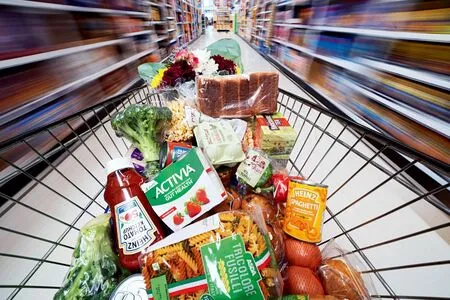
A shopping cart in a supermarket in Manchester,England,April 13,2022.(XINHUA)
A greater threat to the global economy is the loss of confidence in globalization caused by the short-term impact of the Russia-Ukraine conflict coupled with inflation.
“Russia’s invasion of Ukraine has led to a new round of predictions that the end of globalization is nigh,much like we saw at the beginning of the COVID-19 pandemic,”said an article published on Harvard Business Review in April.
Following the outbreak of the Russia-Ukraine conflict,the United States and European Union announced“crushing sanctions”against Russia.Russian financial institutions were excluded from the SWIFT banking system,its central bank’s foreign reserves were frozen,its most-favored nation status was withdrawn,imports and exports of certain products were restricted,and individuals’ overseas assets were frozen.Several countries forbid Russian aircrafts from entering their territories.Some European universities announced a ban on cooperation in scientific research in their names with Russian institutions or individuals.International flow of trade,capital,and information,three major pillars of globalization,were all undermined.
“In a sense,the Russia-Ukraine crisis,as well as the sanctions and retaliation following the crisis,opened a Pandora’s box,”said Bai Ming.“In a world of economic globalization,no country can stay away from it.”
Excluding Russia from the SWIFT banking system was not the most destructive sanction measure,but is the most controversial.An abbreviation for the Society for Worldwide Interbank Financial Telecommunication,SWIFT provides secure financial messaging services.It doesn’t involve cash transfers but is used to send and receive transaction instructions.Since its establishment in 1973,the system has become an important part of international trade.Statistics in 2020 showed that there were more than 11,000 financial institutions across the world using the system,which handled 38 million transaction messages every day.
The DPRK and Iran have long been excluded from the SWIFT banking system.Venezuela was excluded in 2019.Russia’s financial system was deeply integrated with the SWIFT banking system.Therefore,the sanctions will have a far-reaching influence.A March op-ed published in The Washington Post said that the sanctions could increase the risk of the United States losing control of the global financial and payment system.Turbulence in Europe in the 20th Century gave the United States a chance to gain control over the international financial and payment system.But weaponizing financial infrastructure will only deepen other countries’ doubt in the United States.China is developing an independent cross-border payment system,and cryptocurrency and block chain technology have offered banks alternative messaging tools outside the SWIFT system.The more successful the United States and its allies are at weaponizing the financial system,the further Russia and other countries will go to decentralize its power.
The U.S.senate and congress even tried to expel Russia from the World Trade Organization (WTO),which has never happened in the history of the WTO.The Wall Street Journal cited a researcher on international trade from Georgetown University saying that the international trading system people know is falling apart.The global trading system with WTO fosters fewer trade barriers and empowers every country to leverage its comparative advantages.However,globalization in this sense has long faced great pressure.Competition among economies,closure of factories in developed countries,and the race to shut down borders when crisis occurs are accelerating the breakdown of the international trading system.
But many caution that while the Ukraine conflict may be exposing the limits of a hyper-interconnected world and push globalization into retreat,it is unlikely to spell the full demise of the globalized economy.
Some look at a possible economic realignment of“l(fā)ike-minded nations”to a world that is less global,more ideological,and divided into camps.
O’Sullivan told The Economist that in the future,people will see a multipolar world dominated by at least three large regions:the United States,the EU,and a China-centric Asia.They will increasingly take very different approaches to economic policy,warfare,technology and society,and countries like Russia,Britain,Australia and Japan will struggle to find their place in the world,he explained.Institutions of the 20th century—the World Bank,the International Monetary Fund and the WTO—will appear increasingly defunct.
With the war raging in Ukraine,many contemplate where globalization is headed.

